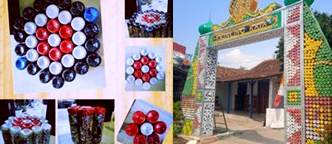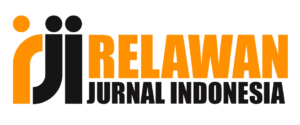The The Role of Community Initiatives in the Implementation of Zero-Waste Policy in Kendal Regency: Case Study of KerDUS Community
DOI:
https://doi.org/10.31292/mj.v4i2.71Keywords:
Zero-waste, waste management, environmental sustainabilityAbstract
The waste problem increasingly threatens life. The biosphere encompasses both land and water bodies. Burned waste causes air pollution and produces greenhouse gases that contribute to global warming. Various methods have been implemented, including recycling, but only 20% of waste is successfully recycled. This This study investigates efforts to reduce waste by adopting a zero-waste lifestyle in Kendal Regency, Indonesia, with the participation of the KerDUS Community. The research employs qualitative methods such as interviews, documentation, participatory observation, and literature review. The results show that the education and training conducted by the KerDUS Community have successfully increased public awareness of the importance of waste management. This article also examines the environmental policies needed to support the implementation of a zero-waste lifestyle, including regulations, incentives, and the development of recycling infrastructure. We also discuss strategies to increase awareness and community participation through continuous education, environmental campaigns, and collaboration between the government, communities, and the private sector. With the right policies, it is hoped that the zero-waste lifestyle can be more widely and effectively implemented to reduce waste generation and its negative impacts on the environment in Kendal Regency.
Downloads
References
Abhishek Kumar, A., Cheela, V. R. S., D’Adamo, I., Iacovidou, E., Islam, M. R., Johnson, M., Miller, T. R., Parajuly, K., Parchomenko, A., Radhakrishnan, L., Zhao, M., Zhang, C., & Li, J. (2021). Zero-waste Approach Towards a Sustainable Waste Management. Resources, Environment and Sustainability, 3(January), 100014. https://doi.org/10.1016/j.resenv.2021.100014
Ali, S. R., & Kumar, R. (2019). Strategic Framework and Phenomenon of Zero-waste for Sustainable Future. Contaminants in Agriculture and Environment: Health Risks and Remediation, 1, 200–215. https://doi.org/10.26832/aesa-2019-cae-0167-015
Budiani et al.(2022). Analisis Hubungan Sektor Unggulan Industri Pengolahan dengan IPM Kabupaten Kendal Tahun 2010 – 2019. Majalah Geografi Indonesia.
Deviyanti.(2024). Sosialisasi Gerakan Zero Waste dalam Pengolahan Limbah Sampah Rumah Tangga bagi Warga Kelurahan Klampis Surabaya. Pengabdian Masyarakat dan Inovasi Teknologi (Dimastek).
Handayana, I. G. N. Y., Angraini, L. M., Sudiarta, I. W., Qomariyah, N., & Alaa, S. (2019). Gerakan Zero-waste Sebagai Pendidikan Lingkungan Bersih. Warta Desa, 1(3), 279–288.
Hidayati, N., Hajar, N., & Setiyanto, F. (2021). Education of Waste Management Based on Zero-waste in Kendal District (Case Study : Waste Recycling Craft Community (Kerdus), Kendal District, Central Java ). IOP Conf. Series: Earth and Environmental Science, 755. https://doi.org/10.1088/1755-1315/755/1/012077
HS, S. (2023). Tantangan penerapan gaya hidup zero waste skala rumah tangga di indonesia. Jurnal Multidisiplin West Science, 2(07), 511-522. https://doi.org/10.58812/jmws.v2i07.491
Jambeck et al.(2015). Plastic waste inputs from land into the ocean. Science.
Khairunisa, N. S., & Safitri, D. R. (2020). Integrasi Data Sampah Sebagai Upaya Mewujudkan Zero-waste Management : Studi Kasus di Kota Bandung. Analisa Sosiologi, 9, 108–123.
Khania, A., Satria, A., & Purwandari, H. (2022). Stakeholder dan pengaruh insentif dalam pengelolaan kolaboratif kawasan konservasi perairan. Jurnal Sains Komunikasi Dan Pengembangan Masyarakat [Jskpm], 6(3), 346-362. https://doi.org/10.29244/jskpm.v6i3.994
Kurniawan, Z. (2023). Menuju lingkungan berbudaya: revolusi hijau melalui bank sampah komunitas. Jurnal Pembelajaran Pemberdayaan Masyarakat (Jp2m), 4(2), 444-450. https://doi.org/10.33474/jp2m.v4i2.20329
Kustanti et al.(2020). Tinjauan Nilai Manfaat pada Pengelolaan Sampah Plastik Oleh Sektor Informal (Studi Kasus: Kecamatan Purwodadi, Kabupaten Grobogan). Jurnal Ilmu Lingkungan.
McKenzie-Mohr, D. (2000). Fostering sustainable behavior: An introduction to community-based social marketing. Journal of Social Issues, 56(3), 543-554.
Nizar, M., Munir, E., Munawar, E., & Irvan. (2017). Manajemen Pengelolaan Sampah Kota Berdasarkan Konsep Zero-waste : Studi Literatur. Jurnal Serambi Engineering, 4(2), 93–102.
Setyono, A. E., & Sinaga, N. (2021). Zero-waste Indonesia: Peluang, Tantangan dan Optimalisasi Waste to Energy. EKSERGI Jurnal Teknik Energi, 17(2), 116–124. https://doi.org/10.32497/eksergi.v17i2.2619
Sugiyono. (2016). Metode Penelitian Kombinasi (Mixed Methode) (Sutopo (ed.); 8th ed.). Alfabeta.
Thøgersen, J. (2006). Norms for environmentally responsible behavior: An extended taxonomy. Journal of Consumer Policy, 29(4), 349-370.
Viarecoa, H. (2024). Sosialisasi pengelolaan sampah dari sumber berbasis kolaboratif: membangun strategi keberlanjutan lingkungan. Qardhul Hasan Media Pengabdian Kepada Masyarakat, 10(1), 20-25. https://doi.org/10.30997/qh.v10i1.11537
Widiarti, I. (2012). Pengelolaan sampah berbasis “zero waste” skala rumah tangga secara mandiri. Jurnal Sains &Teknologi Lingkungan, 4(2), 101-113. https://doi.org/10.20885/jstl.vol4.iss2.art4
Wilson, D. C., et al. (2015). Global waste management outlook. United Nations Environment Programme.
Zaman, A. (2022). Zero-Waste : A New Sustainability Paradigm for Addressing the Global Waste Problem. In The Vision Zero Handbook (p. 24). Curtin University Sustainability Policy Institute, School of Design and the Built Environment, Curtin University.
Zaman, A. U., & Lehmann, S. (2013). The Zero-waste Index: A Performance Measurement Tool for Waste Management Systems in a “Zero-waste City.” Journal of Cleaner Production, 50(April), 123–132. https://doi.org/10.1016/j.jclepro.2012.11.041
Zulfa, S. A., Rahayu, P., & Rini, E. F. (2021). Ngemplak Sutan Sebagai Kampung Zero-waste di Surakarta. Desa-Kota, 3(1), 49–60. https://doi.org/10.20961/desa-kota.v3i1.34463.49-60
Detiknews. Rabu 19 Februari 2020. Mengenang Tragedi Longsor Sampah di TPA Leuwigajah. News.detik.com. diakses tanggal 25 Februari 2021
https://www.kendalkab.go.id/berita/id/20191016004/sekda_kendal__pengelolaan_sampah_harus_dirubah_dari_sumbernya diakses tanggal 8 Mei 2021
http://dlh.kendalkab.go.id/berita/sejarah-hari-peduli-sampah-nasional diakses tanggal 8 Mei 2021
https://nationalgeographic.grid.id/read/132263813/studi-jumlah-sampah-di-bumi-akan-mencapai-13-miliar-ton-pada-2040 senin 27 Juli 2020
https://journals.sagepub.com/doi/pdf/10.1177/0734242X231170264 diakses tanggal 4 Juni 2024 atau 0734242X231170264 (sagepub.com)

Downloads
Published
How to Cite
Issue
Section
License
Copyright (c) 2025 Nanik Hidayati, Septika Rizqiani, Muhamad Aris Sunandar (Author)

This work is licensed under a Creative Commons Attribution-ShareAlike 4.0 International License.

















